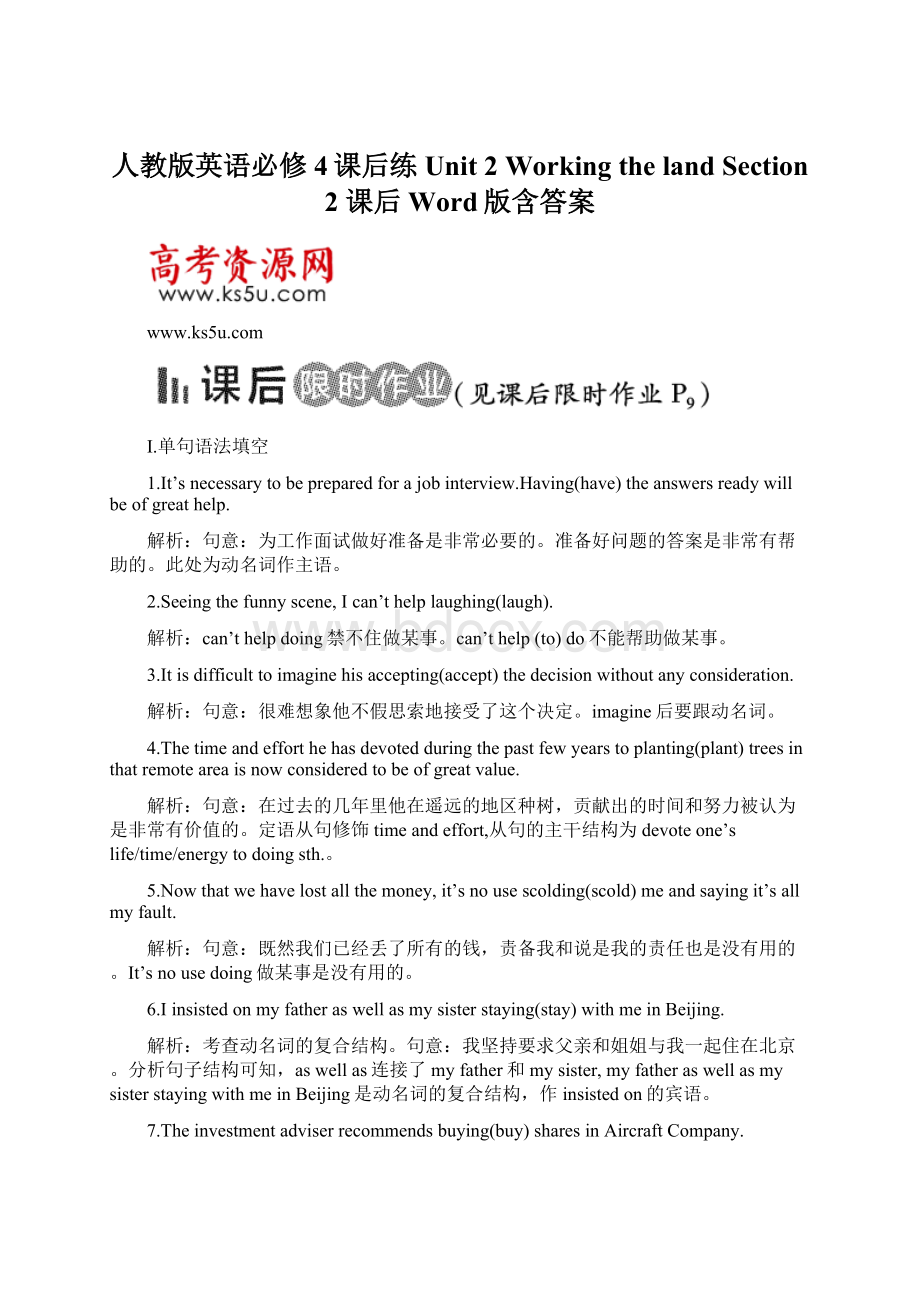人教版英语必修4课后练Unit 2 Working the land Section 2 课后 Word版含答案.docx
《人教版英语必修4课后练Unit 2 Working the land Section 2 课后 Word版含答案.docx》由会员分享,可在线阅读,更多相关《人教版英语必修4课后练Unit 2 Working the land Section 2 课后 Word版含答案.docx(8页珍藏版)》请在冰豆网上搜索。

人教版英语必修4课后练Unit2WorkingthelandSection2课后Word版含答案
Ⅰ.单句语法填空
1.It’snecessarytobepreparedforajobinterview.Having(have)theanswersreadywillbeofgreathelp.
解析:
句意:
为工作面试做好准备是非常必要的。
准备好问题的答案是非常有帮助的。
此处为动名词作主语。
2.Seeingthefunnyscene,Ican’thelplaughing(laugh).
解析:
can’thelpdoing禁不住做某事。
can’thelp(to)do不能帮助做某事。
3.Itisdifficulttoimaginehisaccepting(accept)thedecisionwithoutanyconsideration.
解析:
句意:
很难想象他不假思索地接受了这个决定。
imagine后要跟动名词。
4.Thetimeandefforthehasdevotedduringthepastfewyearstoplanting(plant)treesinthatremoteareaisnowconsideredtobeofgreatvalue.
解析:
句意:
在过去的几年里他在遥远的地区种树,贡献出的时间和努力被认为是非常有价值的。
定语从句修饰timeandeffort,从句的主干结构为devoteone’slife/time/energytodoingsth.。
5.Nowthatwehavelostallthemoney,it’snousescolding(scold)meandsayingit’sallmyfault.
解析:
句意:
既然我们已经丢了所有的钱,责备我和说是我的责任也是没有用的。
It’snousedoing做某事是没有用的。
6.Iinsistedonmyfatheraswellasmysisterstaying(stay)withmeinBeijing.
解析:
考查动名词的复合结构。
句意:
我坚持要求父亲和姐姐与我一起住在北京。
分析句子结构可知,aswellas连接了myfather和mysister,myfatheraswellasmysisterstayingwithmeinBeijing是动名词的复合结构,作insistedon的宾语。
7.Theinvestmentadviserrecommendsbuying(buy)sharesinAircraftCompany.
解析:
考查动名词。
句意:
投资顾问建议购买航空公司的股票。
recommend后接动名词作宾语。
8.Theyhavejustcomeheretogetdowntorepairing(repair)thebrokenwindows.
解析:
句意:
他们刚刚来到这儿开始维修损坏的窗户。
getdowntosth.开始做某事,其中to是介词,其后接名词、代词、动名词。
9.Wegreatlyappreciateyougiving(give)usatimelyhandwhenfacedwithtrouble.
解析:
句意:
我们非常感激你在我们困难的时候及时地帮助我们。
appreciate作“感激”讲时,后接动名词作宾语。
10.Thereisnosenseasking(ask)questionsifyoudon’tlistentotheanswer.
解析:
考查固定句式。
句意:
如果你不听答案,提问毫无意义。
Thereisnosense(in)doingsth.做某事没有道理或好处。
Ⅱ.单句改错
1.Onelearnsalanguagebymakingmistakesand
them.
解析:
介词by后用动名词作宾语,correcting与making为并列关系。
2.Thenaughtyboyadmitted
mywindowbyaccident.
解析:
admit后接动名词作宾语。
句意:
这个顽皮的男孩承认无意打破了我的窗户。
3.WhenPeterspeaksinpublic,healwayshastrouble
oftherightthingstosay.
解析:
havetrouble(in)doingsth.做某事有困难,为固定用法。
4.Itisnouseforyou
forhiminthiscrowd;itislikelookingforaneedleinasea.
解析:
“It+be+nouse/good”之后常用动名词作主语,而少用不定式,但是如果该句型中用了for引出不定式的逻辑主语,这时就只能用不定式。
5.Westressthatwedon’tpermitto
inthelectureroom.
解析:
permit许可,允许,可用于permitdoingsth.和permitsb.todosth.结构中,故将tosmoke改为smoking。
6.Justshortlyaftertheearthquaketheysetupan
table.
解析:
分析句子结构可知,此处是定语修饰table,因此用operating,动名词作定语表示所修饰词的用途。
7.Ipreferwalkingalongthecountryroadto
athomewatchingTVallthetime.
解析:
preferdoing…todoing…宁愿做……而不做……,staying作介词to的宾语,与walking是并列关系。
8.Iamconsideringdelayingpracticing
footballbecauseofweather.
解析:
practice后用动名词作宾语,因此把不定式改为动名词。
9.Mygrandmotherhadahardtimeto
endsmeetafterherhusbandwentmissing.
解析:
此题考查了haveahard/difficult/toughtimeindoing…结构,其中介词in可以省略,因此将tomake改为making。
10.Mylittlesonwasnotusedto
awayfromhomeforsolong.
解析:
beusedto习惯于……,其中to是介词,其后接名词、动名词、代词或名词性从句,故此处用动名词作宾语。
Ⅲ.阅读理解
AsInternetusersbecomemoredependentontheInternettostoreinformation,arepeoplerememberingless?
Ifyouknowyourcomputerwillsaveinformation,whystoreitinyourownpersonalmemory,yourbrain?
ExpertsarewonderingiftheInternetischangingwhatwerememberandhow.
Inarecentstudy,ProfessorBetsySparrowconductedsomeexperiments.SheandherresearchteamwantedtoknowtheInternetischangingmemory.Inthefirstexperiment,theygavepeople40unimportantfactstotypeintoacomputer.Thefirstgroupofpeopleunderstoodthatthecomputerwouldsavetheinformation.Thesecondgroupunderstoodthatthecomputerwouldnotsaveit.Later,thesecondgrouprememberedtheinformationbetter.Peopleinthefirstgroupknewtheycouldfindtheinformationagain,sotheydidnottrytorememberit.
Inanotherexperiment,theresearchersgavepeoplefactstoremember,andtoldthemwheretofindtheinformationontheInternet.Theinformationwasinaspecificcomputerfolder(文件夹).Surprisingly,peoplelaterrememberthefolderlocation(位置)betterthanthefacts.WhenpeopleusetheInternet,theydonotremembertheinformation.Rather,theyrememberhowtofindit.Thisiscalled“transactivememory(交互记忆).”
AccordingtoSparrow,wearenotbecomingpeoplewithpoormemoriesasaresultoftheInternet.Instead,computerusersaredevelopingstrongertransactivememories;thatis,peoplearelearninghowtoorganizehugequantitiesofinformationsothattheyareabletoaccessitatalaterdate.Thisdoesn’tmeanwearebecomingeithermoreorlessintelligent,butthereisnodoubtthatthewayweusememoryischanging.
1.Thepassagebeginswithtwoquestionsto.
A.introducethemaintopic
B.showtheauthor’sattitude
C.describehowtousetheInternet
D.explainhowtostoreinformation
解析:
A推理判断题。
本文通过“arepeoplerememberingless”以及“whystoreitinyourownpersonalmemory,yourbrain”这样的问题来导入下文两个实验要论证的主题。
2.Whatcanwelearnaboutthefirstexperiment?
A.TheSparrow’steamtypedtheinformationintoacomputer.
B.Thetwogroupsrememberedtheinformationequallywell.
C.Thefirstgroupdidnottrytoremembertheinformation.
D.Thesecondgroupdidnotunderstandtheinformation.
解析:
C细节理解题。
根据第二段中的“Peopleinthefirstgroupknewtheycouldfindtheinformationagain,sotheydidnottrytorememberit”可知,C项正确。
3.Intransactivememory,people.
A.keeptheinformationinmind
B.changethequantityofinformation
C.organizeinformationlikeacomputer
D.rememberhowtofindtheinformation
解析:
D细节理解题。
根据第三段最后两句话“Rather,theyrememberhowtofindit.Thisiscalled‘transactivememory(交互记忆)’”可知,答案为D项。
4.WhatistheeffectoftheInternetaccordingtoSparrow’sresearch?
A.Weareusingmemorydifferently.
B.Wearebecomingmoreintelligent.
C.Wehavepoorermemoriesthanbefore.
D.Weneedabetterwaytoaccessinformation.
解析:
A推理判断题。
从文中可知,由于人们现在知道因特网是可以存储信息的,故现在的人们不像过去那样记忆信息本身,而是记忆存储信息的位置。
即现在人们在记忆的使用方面是不同的。
Ⅳ.完形填空
Myprevioushomehadastandofwoodsbehinditandmanyanimalsinthebackyard.Thatfirstyear,I1feedingpeanutstothebluejays,thenthesquirrels.Thesquirrelshadno2cominguprighttomeforthem.Asthemonthswentby,therabbitssawthatIwasno3anddidn’tescape.WhenIthrewcarrotslices(薄片),theyevencameforanibble(啃).Slowlytheycameto4me,andbytheendoftheyeartheywereeatingoutofmyhand.
Thatsecondyear,therabbits5me,andonewouldevensitupforslices!
WhileIwasfeedingthem,I6thatagroundhogwhousedtorunawaywasnowtakingan7interestinthisfoodsituation.Icarefullyextendedalong8,withakeeneyeonthoseteeth,
and9,thereweretimesIwouldhavethegroundhogsittingnexttoarabbit,bothmunching(津津有味地咀嚼)oncarrots.Afewmonthslater,while10,shewouldeventurnherbacktome.11whenshewasfacingaway,Ireachedoutand12scratched(搔)herbackwithmyfinger.Shedidn’tmove.
Byyearthree,therabbitsandthegroundhogwereback.Thegroundhog13didn’thaveaproblemwithmescratchingherback,andIgotanidea,I’dalways14,whileslicingupcarrots,thattheendlookedlikeacap.15oneday,justtoseewhatshewoulddo,Igently
16oneontopofthegroundhog’shead.Again,nota17.Thenexttime,Ihadmycamerareadytorecordwhatyouseehere,oneofseveraldozensuchpictures.18shehadaslicetoeat,shenever19theoneofherhead.Itwasafair20—Igotapleasure,andshehadyetanothertastytreat.
1.A.avoidedB.startedC.canceledD.suggested
解析:
B第一年,“我”开始给冠蓝鸦喂花生吃,然后又喂松鼠。
startdoingsth.开始做某事。
2.A.businessB.funC.problemD.privilege
解析:
C松鼠毫无困难(problem),直接上来享用花生。
3.A.helpB.cheatC.threatD.exception
解析:
C几个月过去了,兔子见“我”没有威胁,不逃走了。
threat威胁,符合语境。
4.A.trustB.missC.admireD.appreciate
解析:
A根据“theywereeatingoutofmyhand”可知,它们都信任“我”。
故选trust“信任,信赖”。
5.A.fearedB.ignored
C.discoveredD.remembered
解析:
Dremember想起,记得。
第二年,兔子记得“我”,甚至有一只会坐着享用胡萝卜薄片。
6.A.provedB.decidedC.noticedD.understood
解析:
C结合空后内容可知,此处是“我”注意到的现象。
notice注意,符合语境。
7.A.extremeB.increasingC.additionalD.inspiring
解析:
Bincreasing不断增加的。
当“我”给冠蓝鸦、松鼠、兔子喂食物的时候,“我”注意到以前会跑开的土拨鼠对这种喂食情况越来越感兴趣了。
8.A.squirrelB.rabbitC.peanutD.carrot
解析:
D“我”小心翼翼地伸出一个长长的胡萝卜。
下文中的“bothmunching(津津有味地咀嚼)oncarrots”也是提示。
9.A.beforelongB.longago
C.overandoverD.alloveragain
解析:
A不久之后,土拨鼠就坐在兔子旁边,津津有味地咀嚼着胡萝卜。
beforelong不久之后,符合语境。
10.A.eatingB.playingC.sittingD.sleeping
解析:
A在几个月后,咀嚼着(eating)胡萝卜时,土拨鼠甚至会背朝着“我”。
11.A.NextB.OnceC.SoonD.Lately
解析:
BOnce有一次,此处是介绍“我”的一次经历。
12.A.carefullyB.suddenlyC.violentlyD.patiently
解析:
A当土拨鼠转身后,“我”小心翼翼地(carefully)伸出手,用手指抓挠她的背。
13.A.alsoB.thusC.justD.still
解析:
D第三年,兔子和土拨鼠回来了。
“我”用手指抓挠土拨鼠的背仍然(still)没有困难。
14.A.thoughtB.doubtedC.admittedD.recognized
解析:
A切胡萝卜片的时候,“我”一直认为(thought)胡萝卜头看起来像一顶帽子。
15.A.WhileB.OrC.SoD.For
解析:
CSo因此,引出结果。
因此有一天,“我”轻轻地将胡萝卜头放在土拨鼠的头上,看看她会做什么。
16.A.fixedB.placedC.hungD.kept
解析:
Bplace放置。
此处指“我”轻轻地将胡萝卜头放在土拨鼠的头上。
17.A.trembleB.moveC.delayD.hesitation
解析:
B根据下文中的“Thenexttime,Ihadmycamerareadytorecordwhatyouseehere,oneofseveraldozensuchpictures”可知,“我”轻轻地将胡萝卜头放在土拨鼠的头上时,土拨鼠没有半点移动(move)。
18.A.EvenifB.EversinceC.AsfarasD.Solongas
解析:
D只有土拨鼠有一片胡萝卜吃,她从不管头上的胡萝卜头。
Solongas只要,引导条件状语从句。
19.A.welcomedB.requiredC.botheredD.expected
解析:
C参见上题解析。
bother费心,因……操心,符合语境。
20.A.tradeB.competitionC.taskD.affair
解析:
A根据下文中的“Igotapleasure,andshehadyetanothertastytreat”可知,这是公平的交易。
fairtrade公平交易。
Ⅴ.语法填空
(2016·河北保定高一期末调研)Today,myfriendandIwenttothepostofficetomailapackagetoanoldfriend.She1.teaches(teach)religion,andwemakered,white,andbluerosaries(念珠)2.inhonorofourmenandwomeninIraqandAfghanistan.Ourfriend3.hadexpressed(express)interestinourhandmade